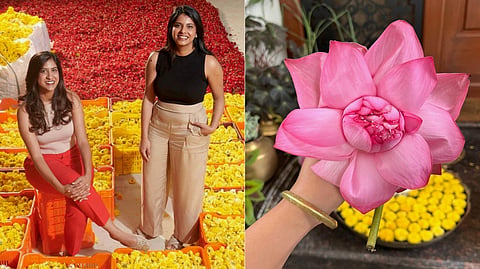
- HOMEGROWN WORLD
- #HGCREATORS
- #HGEXPLORE
- #HGVOICES
- #HGSHOP
- CAREERS
- ABOUT US
- CONTACT US

The beauty of India is amplified through its traditions that provide space for humans to interact with the natural world. It is through multiple small rituals that we engage with the sensory experience of becoming one with our environment. Such practices are emblematic of the South Asian ethos that is rooted in a profound understanding of nature and involves worshipping it as a feminine energy. This is done through a number of customs that involve flowers as an offering to deities.
These traditional flowers are used every single day in morning prayers, as hair decoration, or as auspicious symbols hung in auto, cars and offices. In India, their usage is a ubiquitous need, much like the daily newspaper or milk. However, the enormous sector of the flower market which makes up for at least 481,907 acres of production in India has barely changed in the last three decades. Since it remains fragmented and unorganised, with flower wastage figures as high as 40%.
Two young sisters who grew up on floriculture farms hearing about harvest cycles, auction prices and freight rates, Yeshoda Karuturi and Rhea Karuturi, decided to change the system. Their father started his rose farm in 1994 and grew to have farms in India, Ethiopia and Kenya. He then set up the International Flower Auction Bangalore and helped others view the entire production cycle through new eyes. At present the two sisters are following the footsteps of their father in order to revolutionise the flower market.
Flowers are currently being passed down multiple hands and reach the customer within almost 36-48 hours without any proper care. Their company, 'Hoovu', is reducing the delivery time to 12-24 hours by partnering with local farms to get the flowers as soon as they are harvested. They then take extra care by sealing the flowers in order to extend their shelf life. They also dispatch orders through faster channels that involve quicker delivery and provide multiple items such as incense sticks created using flower waste, that would otherwise be thrown away into rivers and landfills.
Hoovu is providing a better agricultural landscape for farmers to flourish and are in turn reviving many Indian customs involving regular use of fresh flowers. The woman led business is also employing workers from around the country and making the entire supply chain more sustainable for the environment. The two sisters recently appeared on Shark Tank India, Season 2 and successfully managed to get an investment for their company, you can learn more about the homegrown business here.
If you enjoyed reading this, here's more from Homegrown:
Fermentation Is Making An Emphatic Comeback Across India’s Gastronomic Landscape
Diaspora Co. Is Taking A Radically New Approach To Spice Cultivation In South Asia
Visual Artist Sameer Kulavoor's 'Edifice Complex' Intersects Urban Architecture & Identity
